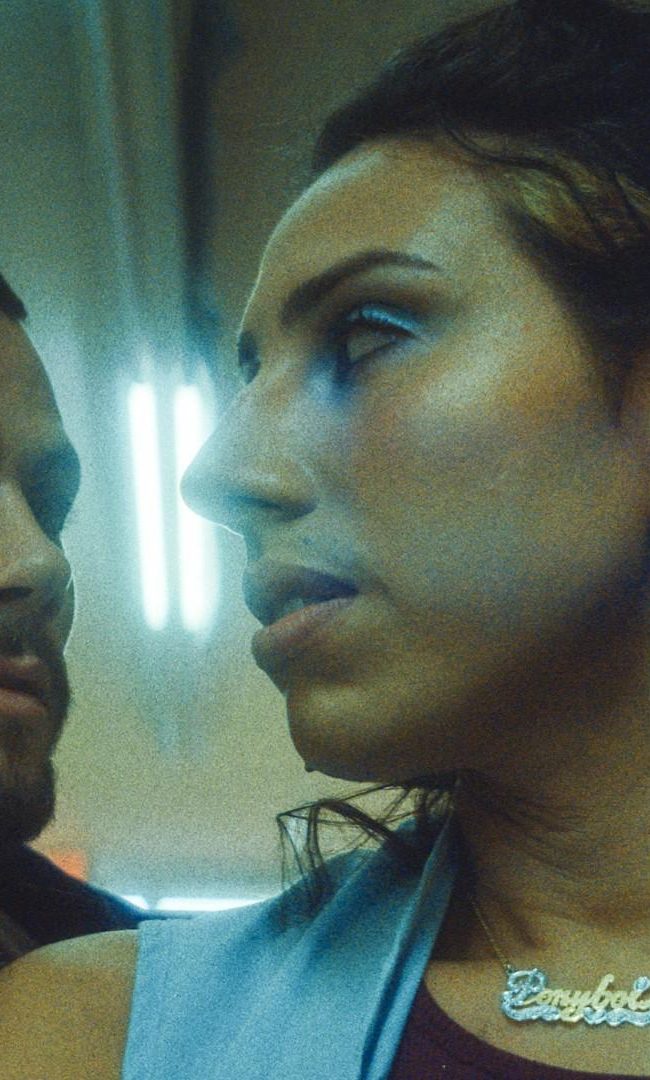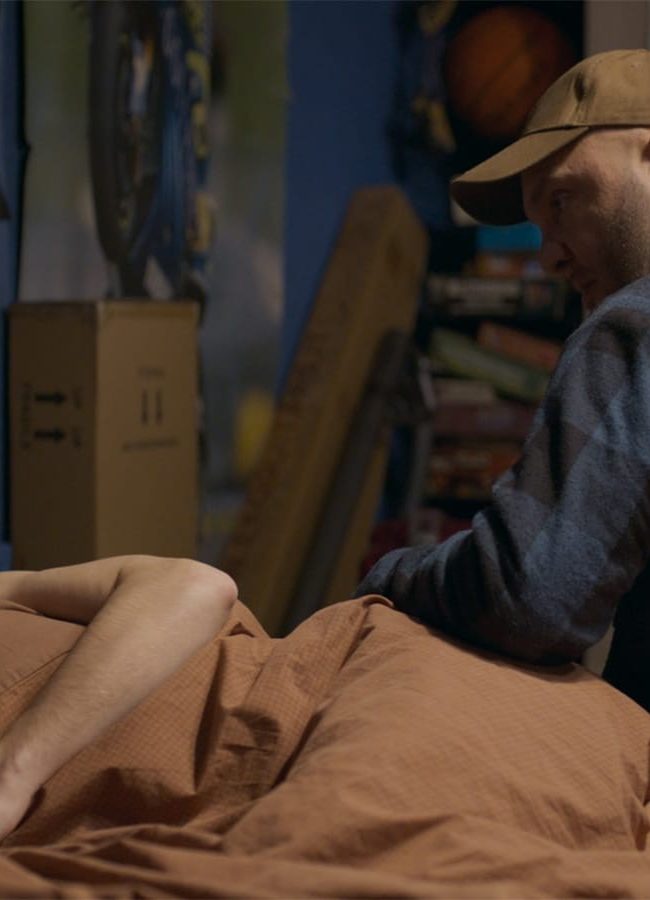A Conversation With Eddie Rosenstein (FREEDOM TO MARRY)
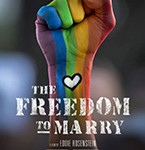 I spoke by phone with filmmaker Eddie Rosenstein on Thursday, May 25, 2017, about the making of his latest documentary, The Freedom to Marry (which I reviewed, as well, at the Washington Jewish Film Festival). It tells the story of the landmark 2015 decision by the United States Supreme Court to legalize same-sex marriage. A profound testament to the power of grassroots movements, the film profiles the heretofore unsung heroes of the decades-long battle for equal rights for gays and lesbians, including Evan Wolfson and Marc Solomon of Freedom to Marry and Mary Bonauto of GLAD. Here is a condensed digest of our chat, edited for brevity and clarity.
I spoke by phone with filmmaker Eddie Rosenstein on Thursday, May 25, 2017, about the making of his latest documentary, The Freedom to Marry (which I reviewed, as well, at the Washington Jewish Film Festival). It tells the story of the landmark 2015 decision by the United States Supreme Court to legalize same-sex marriage. A profound testament to the power of grassroots movements, the film profiles the heretofore unsung heroes of the decades-long battle for equal rights for gays and lesbians, including Evan Wolfson and Marc Solomon of Freedom to Marry and Mary Bonauto of GLAD. Here is a condensed digest of our chat, edited for brevity and clarity.
Hammer to Nail: So, you grew up in the same town in as your principal subject, Evan Wolfson, though he is 6 years older than you. How did you reconnect for the making of this film?
Eddie Rosenstein: I just sent him a Facebook message. I hadn’t been in touch with him for 10-15 years, but I knew that they were heading to the Supreme Court, and I knew, as a documentary filmmaker, that this was a huge story, one of the biggest civil-rights stories of our generation. If I didn’t ask…I had to at least ask, “Who’s making the film?”…I would kick myself forever if I didn’t ask the question and nobody was on it, and I assumed that there were already many good filmmakers on this story. But it turns out he had said no to them all, for a million reasons: it wasn’t the right time, it wasn’t the right filmmaker, the right project. So I happened to text him, asking “Who’s making the film? Just want to to be sure it’s under control…and by the way, this is Eddie, from the neighborhood…Little Eddie…” (laughs) And he said, “Come see me,” and I went in the next day, and he said, “Yeah, you’re making the film.” And we started shooting literally the day after that.
HtN: So this was in 2015?
ER: Yes. 2015. It was at the end of January, beginning of February.
HtN: So, your film opens in the days before the June 26 decision, and then you flash back 102 days. Is the 102-day flashback back to your first shooting day?
ER: Yeah!
HtN: Interesting. Well, congratulations on being the one who got the movie, then. So, I confess that I have not seen your other work. How does this film fit in, thematically, to your previous work?
ER: You know, you might think it’s from left field, because it’s my first LGBT film – I’m not gay and this isn’t my issue, particularly – but I think it fits in, thematically, quite closely with all my work, because my films tend to be stories that I find inspirational, about regular people who, against crazy odds, change the world as well as they can. These are audacious people, and that doesn’t mean that they have to be a world-class civil-rights leader. Audacious can mean kids who have the balls to take on a role in a school play, which is terrifying to them.
HtN: In fact, I believe you have a film that is called School Play, correct?
ER: I do, and it’s one of my favorite films I’ve ever made. It’s the story of fifth graders who are pushed to their limits by a very inspiring, yet demanding, grade-school theater coach. And it’s beautiful, because it’s just a story of regular people going a little bit farther than you thought they could, and you laugh and you cry. But another film of mine is about union miners who are digging tunnels underneath New York City, and the fate of New York, and maybe the country, is on their shoulders, but you’ve never heard of them; they’re anonymous, but they are doing incredible things. They’re my heroes. Just regular people doing things right below our noses.
And one of the things I love about The Freedom to Marry is that these are not celebrities. These are not presidents and people you see on TV every night. These are … you know, Evan lives in a one-bedroom apartment, and Mary lives in a regular home in Maine, and takes care of her kids and makes lunches in the morning. These are just regular people, but they’re willing to throw so much on their backs and try to make the world a better place.
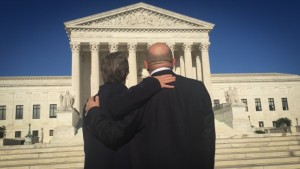
HtN: Yes, indeed. And I would add that even though you mention that you are not gay – and nor am I – and this is your first LGBT film, I would say that this is very much a story for all of us, because any issue of freedom affects everybody.
ER: It’s funny, because I get a lot of interviews from people – especially, I think, gays and lesbians – wondering why a non-gay person would make a film about gay people, which is, in itself, almost a sad question. But yeah, obviously, if you care about our country, or the world, or human rights, then it’s not just human rights for your type of person, it’s…human rights. And you know that if we’re not protecting all people, we’re not protecting anybody.
HtN: Sure! And if you take freedom away from one of us, you take it away from all of us. So, did you have any issues of access? Were there any of your subjects who didn’t want to be in the film initially, but then acquiesced, or were there any people you wanted to put in the film, whom you couldn’t because they just didn’t want to be?
ER: In every documentary, you have to earn your way into every shoot day. You have to prove to people that you’re willing to listen to them and see them and hear them for who they are, without judgment. And that’s whether or not you’re talking about somebody who’s, in this case, either for marriage or against marriage. I wanted to include the opposition as clearly as I could; it’s not a puff piece. So every single shoot day has to be earned. You have to be willing to be emotionally and intellectually available for people.
So in that regard, even though Evan’s parents and my parents are close, I think he was nervous the whole time about somebody telling his story. I was probably his best bet, because if I did a terrible job, my mother would probably never let me in the house again. (laughs) But, still, he didn’t know how it would turn out, and he didn’t have control over the film, and so he was constantly gauging where I am and what I’m thinking, and do I understand the topic well enough.
And even though I had Evan’s blessing, I had to earn the blessing of everyone else in the movement that I came into contact with. I had lengthy conversations where they felt that I was listening and hearing the history and the issues and the themes, and that I was clearheaded and open to doing the job with my whole heart. It was the same way filming the opposition: they also wanted to know that I was listening. It’s just the same thing with every documentary film you make. You’re not paying people to be a part of it, and so they’re right to be cautious. That’s sane. It’s smart! (laughs) You have to be there; you have to show up.
HtN: Sure. And I like the fact that you include the other point of view. I would say that in some ways you allow them to hoist themselves with their own petard.
ER: It’s funny you say that. The problem, for me, was that I would have liked to include more of the opposition, but the more screen time I gave them, the less sympathetic I felt the audience would be towards them. It became hard to give them more screen time. The problem with the opposition, and their part of the story, was that marriage is a civil institution; it’s not a religious institution…in this country. In Israel, for instance, it’s a religious institution, so there is no gay marriage, because you can’t get married outside of the church or the synagogue or the mosque. But here, it’s a civil institution, so you can’t let one religious belief dictate how people will live their lives. That’s just part of the fabric of how we experience the world as Americans. That’s how our laws are built. So to say that you don’t believe in this because of your religious perspective, that’s tough; there’s only so far you can go with that. Other people might not hold your same religious perspective; that doesn’t mean that you can discriminate against them and their beliefs.
So the last piece of their argument that was left was just the argument that the Supreme Court heard, which was that gays and lesbians are less fit as parents than opposite-sex couples. And I could understand how that argument could have once seemed very valid and intuitive to people, yet we’ve had same-sex marriage and same-sex couples for long enough now that…(laughs)…we have a huge body of research. We know how kids are affected by this, and we now know that the kids are not disadvantaged by having two parents of the same sex. We know that instability hurts kids. We know that having one drunk parent, or moving a lot, or a death in the family or…there are plenty of situations that definitely chronically do disadvantage kids, but having two parents of the same sex isn’t one of them. (laughs) So that argument was a difficult one to make, and the more screen time I gave the opposition, it always seemed pejorative to them.
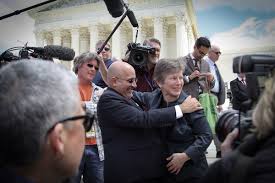
HtN: Of course, and I should add that my own sister has long been married to a woman – they were married in California by a rabbi in a very liberal synagogue, shall we say – and they have raised their two children, who are both very stable, and they have a very stable marriage.
So, yes, absolutely!
ER: (laughs) You know what’s funny, Chris? I coach baseball here in Brooklyn, and one of my earlier experiences, before I spent a lot of time thinking about gay marriage, was with a kid on my team – a great kid, who was close to my son – who tended to have this sort of disappearing act, emotionally, and we get the thousand-mile stare, and I was always trying to figure him out, and the kid would kind of break your heart. And then the following spring, when everyone came back together, the kid had just grown up, by leaps and bounds. And he has two dads, and I said, to one of his fathers, “Wow, your son seems wonderful this year. He’s just really matured.” And he said, “You know what happened? We got married. And he suddenly felt secure.”
HtN: Huh! Interesting…
ER: It broke my heart. It was just so intense.
HtN: Wow! So…moving on from that intensity, for a moment, your film jumps around in time quite a lot, and I really like how you guide us. You have these wonderful on-screen guideposts, and I really love how you create them with your terrific use of motion graphics. Did you work with a bunch of people, one particular person…how much of that came from you, and how much was working with a titles designer? It’s really well done.
ER: Thank you! There are some great graphics guys who did that. I have to say that I love that, too. I went through three teams of artists until I finally settled. We tried that several times, with different post houses and teams of artists, to get that exactly right. The problem with graphics, for me, is that simplicity is so hard to do. It’s hard to make things really powerful and really clear and really fast and really simple. I think the hardest thing with documentary films is not gilding the lily and getting out of your own way, so that the style doesn’t overwhelm the content. A lot of very stylish films are really cool to watch, but you know that in two or three years, they’re going to feel really dated. So, I was really trying to keep the fourth wall of never letting the style overwhelm the subject, and finding a really simple way to do that. The designers, from a company called nice soft t-shirt, just finally cracked the code. But that was like two months to finally figure it out…(laughs)
HtN: So, last question: At the end of your film, I am very sad, even though it’s a triumphant story, because we hear our ex-President Obama speaking, post-decision, and I realize, once again, all that we’ve lost with the election of Donald Trump. Did you feel that, too, or are you more optimistic?
ER: Well, obviously, we finished the film before we knew Donald Trump was going to be the president. But, yeah, America is in a very scary place, and many things we care about are being challenged, maybe the least of which is LGBT issues, compared to freedom of speech, and the press, and environmental issues…almost everything…you know, corruption and honesty…language… (laughs)…proper sentence structure…everything is under attack! And it does feel like a dismal moment, but I think, what I believe now, having experienced this story, is that I feel a real sense of hope. This proved to me that regular people can change the world, and if we really stick to what we believe in, that America can do the right thing. We can live up to our promise.
I’m really excited because we’re showing the film now – and I’m speaking at – an Environmental Defense Fund thing, and we work with immigration groups and gun-control groups, and just a huge list of other progressive causes, who are now working together, across causes, and distilling the lessons of this film, and every other lesson. People are really banding together. Democracy has always been a team sport, but we took it for granted. And it’s nice to see that people like Evan, and Mary, people who were on the battlefield for all these years…they’ve shown us that this can be won. One of the reasons I made this film was to show my kids that they can make a difference. And that was something I believed in 2015, when I started this, and I think that message is more important now than ever.
So, yeah, it’s a terrifying time, and everything’s under attack, but I think this will eventually end. The press is doing its job. People are showing up. People are engaged. Television makes it all seem so dire. And it is! The stakes are very high right now. But at the same time, Hillary only lost by a tiny bit, and actually won, by 3 million votes. You know, we are the same country that had an African-American president for 8 years, without a single scandal. This country is capable of greatness. And even though, by a tiny margin, everything went in a terrible direction, it’s engaging people, and it’s shaking the trees. There will always be 20% on one side that are never going to believe anything other than what they believe. And 20% on the other side. There’s an intractable group on both sides. And they’re getting an undue amount of airspace right now. But we have, really, 60% in the middle, that is always kind of reasonable, and willing to hear each other, and willing to respect each other.
So they haven’t all yet been reached – you know, Evan calls them the reachable-but-not-yet-reached middle – but what this movie and this story shows is that they can be reached. It’s a lot of work, to share your stories, and talk to each other, to get out there, to get involved, but it can be done. And when you get to a cumulative mass where you’ve won in the court of public opinion, then you win in the court of law, and in the legislature. So, I have great hope right now.
HtN: Well…here’s hoping, then. Thanks for making the film! I really enjoyed it.
ER: Thank you, Chris!
– Christopher Llewellyn Reed (@ChrisReedFilm)








